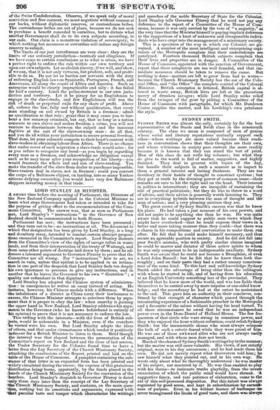LORD STANLEY AS MINISTER.
A SHORT time before the meeting of Parliament, the Directors of the New Zealand Company applied to the Colonial Minister to learn what steps Government had taken or intended to take for the purpose of giving effect to the recommendations of the Com- mons Committee. 'the answer was, that as soon as Parliament met, Lord Stanley's " instructions " to the Governor of New Zealand should be communicated to both Houses.
Parliament has met ; the instructions have been presented ; aind they turn out to be—no instructions at all. The document to -which that designation has been given by Lord Stanley, is a long land desultory essay, intended to combat certain abstract proposi- lions enounced in the Committee's report. Lord Stanley dissents from the Committee's view of the rights of savage tribes in waste 'lands, and from their interpretation of the treaty of Waitangi, and 'from some other points of doctrine laid down by them ; and he ad- dresses a laboured argument to Governor Fitzroy to prove that the
• Committee are all wrong. For " instructions " how to act, we -search in vain, unless that epithet is to be applied to an intima- tion in one part of the despatch that Lord Stanley feels too deeply his own ignorance to presume to give any instructions, and in another that he leaves the Governor to his own " discretion " ; a quality not redundant in that dignitary. • Lord' Stanley has adopted the Chinese system of administra- tion: in emergencies he writes an essay instead of acting. He imitates, however, his Chinese models with a difference. When -the inhabitants of a district in China carry their lawlessness to • excess, the Chinese,-Minister attempts to convince them by argu- ment that it is proper to obey the law : when anarchy is gaining the upper hand in New Zealand, Lord Stanley addresses ins argu- ramita to the Governor (who he knows beforehand is entirely of his opinion) to prove that it is not necessary to enforce the law. This trifling with the interests—with the lives of British sub- jects, would be unbearable in a Minister, even if the crotchets ,lte vented were his own. But Lord Stanley adopts the ideas -of others, and that under cirumstances which render it positively 'indecent for a British Minister to listen to them. Brief though the interval was that elapsed between the presentation of the Committee's report on New Zealand and the close of last session, the Under Secretary for the Colonies found time to have a getter from the Lay Secretary of the Church Missionary Society, attacking the conclusions of the Report, printed and laid on the 'table-of the House of Commons. A pamphlet containing the sub- -stance-of that letter in an expanded form has been printed and 'widely circulated during the recess ; the expense of this gratuitous Idistribution being borne, apparently, by the funds placed in the tbands of the Church Missionary Society for the conversion of the 'heathen. Lord Stanley's despatch to Governor Fitzroy is dated 'only three days later than the rescript of the Lay Secretary of 'the-Church 'Missionary Society, and contains, on the main ques- 4thm, - nothing but its assertions and arguments, expressed with Mat _peculiar taste and 'temper 'which characterize the writings.
and speeches of the noble Secretary of State for the COloniee. Lord Stanley tells Governor Fitzroy that he need not pay any deference to the report of a Committee of the House of Com- mons, because it was only carried by the vote of "a majority," at the very time that the Minister himself is paying- implicit deference to the suggestions of a knot of unknown and irresponsible indivi- duals who have crept into the management of a missionary society. This is a specimen of the way in which our Colonies are go.. verned. A number of the most intelligent and enterprising capi- talists of the Metropolis complain that their undertakings are paralyzed. Fourteen thousand British subjects complain that their lives and properties are in danger. A Committee of the House of Commons, appointed with the sanction of Government, report that these complaints are too well founded, and that im- mediate measures should be taken to remove the cause. But nothing is done—matters are left to grow from bad to worse— because the Church Missionary Society has the ear of the Colo- nial Office, and "the Office" the complete control of the Colonial Minister. British enterprise is fettered, British capital is al- lowed to waste away, British lives are left at the precarious mercy of drunken savages; while Lord Stanley seeks relief from the twinges of the gout by pelting a Committee of the House of Commons with paragraphs, for which Mr. Dandeson Coates supplies the matter, and his Lordship's own petulance the style.


























 Previous page
Previous page